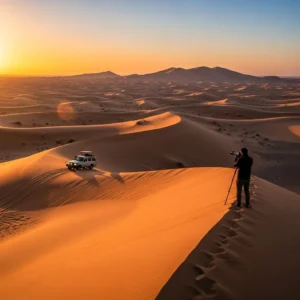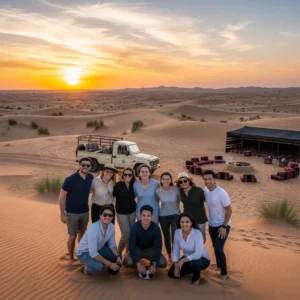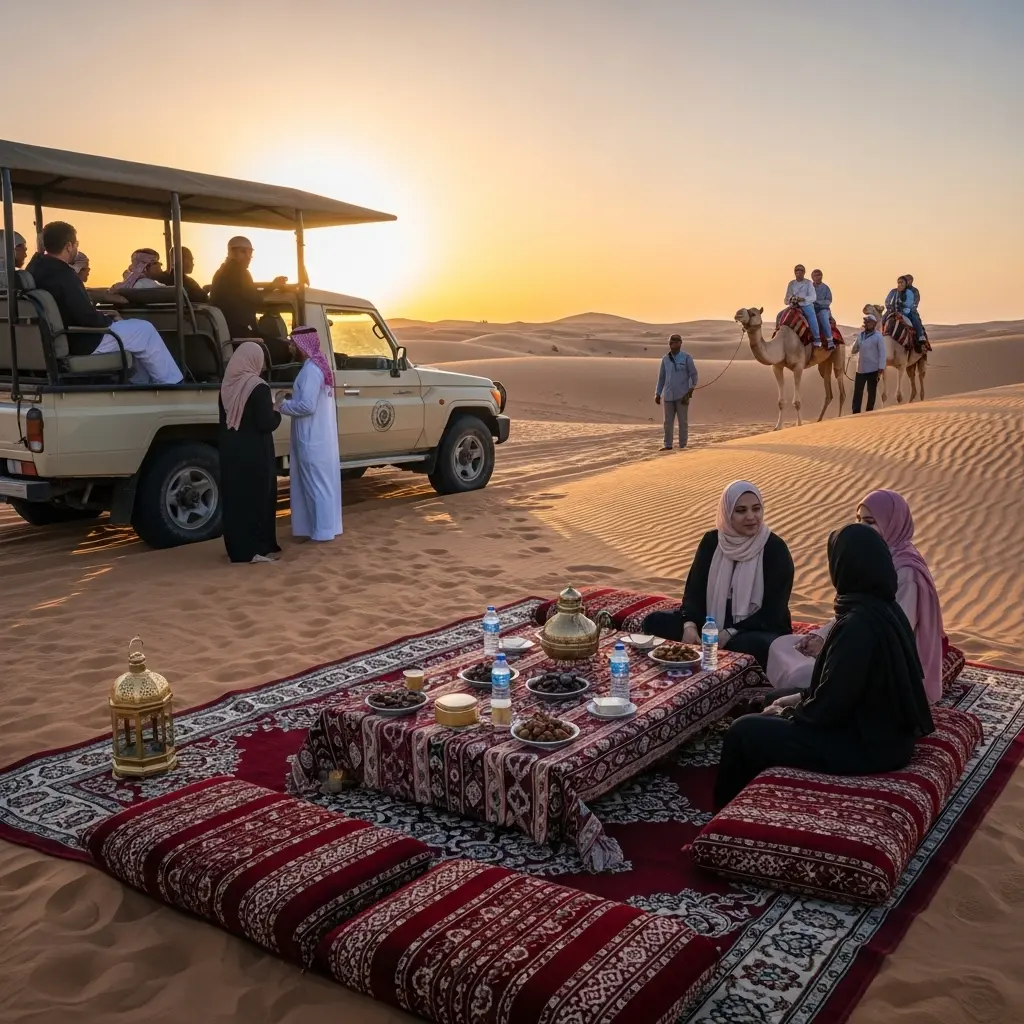A Journey of Serenity: 9 Essential Tips for Experiencing a Ramadan Desert Safari in Dubai
Experiencing a Ramadan desert safari in Dubai is a unique and deeply profound cultural journey. It offers a rare glimpse into the spiritual heart of the UAE, transforming the iconic desert adventure into an experience of serenity, community, and culinary tradition. This is a chance to see beyond the usual high-energy entertainment and connect with the holy month’s tranquil and generous spirit.
During Ramadan, the entire rhythm of the desert safari changes. The focus shifts from adrenaline-pumping thrills to the shared, sacred moment of Iftar—the breaking of the fast at sunset. The atmosphere becomes more peaceful, more reflective, and arguably, more authentic.
This is your ultimate guide to respectfully enjoying and appreciating this special version of the desert safari. We will explore what Ramadan means, how the safari experience is adapted, the exquisite culinary traditions of the Iftar meal, and the essential etiquette for non-Muslim visitors.
Understanding these nuances will not only ensure you are a respectful guest but will also enrich your experience, turning your trip into a memorable cultural immersion. A well-managed tour from a provider like https://royaldesertadventures.ae/ can make a Ramadan desert safari the most meaningful part of your visit.
Understanding Ramadan: The Holy Month of Reflection
To fully appreciate a Ramadan desert safari, it’s essential to understand the significance of the holy month itself.
What is Ramadan?
Ramadan is the ninth and holiest month of the Islamic calendar. It is observed by Muslims worldwide as a month of fasting, prayer, reflection, and community. The dates of Ramadan change each year as they are based on the lunar calendar.
The Core Tenets
The most well-known aspect of Ramadan is the fast (Sawm), where able-bodied Muslims abstain from all food and drink, including water, from dawn until dusk. This act is intended to teach patience, discipline, and empathy for those less fortunate.
The Importance of Iftar
Iftar is the evening meal with which Muslims end their daily fast at sunset. It is a highly anticipated and joyous occasion, often shared with family and friends. The moment the fast is broken is a time of gratitude and community.
The Spirit of Generosity and Community
Ramadan is a time of immense generosity and charity (Zakat). Across the UAE, you will see Iftar tents and food drives, as the spirit of sharing and caring for the community is a central theme of the holy month. This spirit extends to the desert camps, which welcome visitors of all faiths to share in the Iftar meal.
How Does a Desert Safari Change During Ramadan?
The safari itinerary is respectfully adapted to align with the customs of the holy month.
Changes to the Itinerary and Timing
A Ramadan desert safari typically starts later in the afternoon than a standard safari. This is to ensure that guests arrive at the desert camp just before sunset, in time for the breaking of the fast.
Entertainment Modifications
Out of respect for the holy month’s reflective nature, there are significant changes to the entertainment. There is no belly dancing, and loud, celebratory music is replaced with softer, traditional Arabic music (like the Oud). However, the skillful Tanoura dance and the thrilling fire show are usually still performed as they are considered cultural arts.
The Focus Shifts to Culture and Spirituality
The main “event” of the evening is no longer the entertainment but the Iftar meal itself. The experience becomes a cultural and culinary journey, focusing on the traditions and foods that are special to Ramadan.
A More Serene and Peaceful Ambiance
The overall atmosphere of a Ramadan desert safari is much calmer and more peaceful. The camps are often less crowded, and the vibe is more family-oriented and relaxed. It offers a chance to experience the desert’s profound silence in a way that isn’t always possible on a standard tour.
The Heart of the Experience: A Deep Dive into the Iftar Dinner
The Iftar meal is the culinary centerpiece of the Ramadan desert safari. It’s a lavish spread of traditional dishes, each with its own significance.
Breaking the Fast: Dates and Water
The fast is traditionally broken in the manner of the Prophet Muhammad: with a few dates and a sip of water. This gentle start rehydrates the body and provides a quick boost of natural energy after a long day of fasting.
Refreshing Starters: Traditional Ramadan Juices
A variety of sweet, refreshing juices are essential to the Iftar table.
- Jallab: A very popular drink in the Middle East, Jallab is made from a blend of date and grape molasses, mixed with water and scented with rose water. It’s often served with pine nuts and raisins.
- Qamar al-Din: A beautiful, thick, orange-colored juice made from dried apricot paste. It is a classic Ramadan beverage, cherished for its sweet and tangy flavor.
- Laban: A cool and refreshing savory yogurt drink, similar to Ayran. It’s excellent for rehydration and aids in digestion.
The Nourishing First Course: Soups and Appetizers
After the initial dates and juice, the meal continues with warm, nourishing dishes.
- Lentil Soup (Shorbat Adas): A simple, comforting, and nutritious lentil soup is a staple at almost every Iftar. It’s gentle on the stomach and helps to prepare the body for the main feast.
- Harees: An authentic and ancient Emirati dish, Harees is a savory porridge made from wheat that is slow-cooked with meat (usually chicken or lamb) until it reaches a smooth consistency. It’s a hearty and traditional favorite.
- Sambousek: These are small, savory pastries, often filled with cheese, meat, or vegetables. They are a popular and delicious appetizer on the Iftar table.
The Main Feast: A Spread of Hearty Dishes
The main course is a generous buffet featuring a wide array of classic Arabian dishes.
- Lamb Ouzi: Often the centerpiece of the feast, Ouzi is a spectacular dish of a whole lamb or large pieces of lamb, slow-cooked with a blend of aromatic spices and served over a bed of nutty, spiced rice.
- Chicken Biryani: A universally loved dish, the fragrant chicken biryani, with its layers of spiced rice and tender chicken, is a guaranteed feature of the Iftar buffet.
- Salona: This is a traditional Emirati stew (Salona). It can be made with chicken, lamb, or just vegetables and is rich with tomatoes and a blend of local spices known as Bzar.
- Mezze and Salads: A full spread of cold and hot mezze, including hummus, moutabel, tabbouleh, and fattoush, is always available.
Sweet Endings: Traditional Ramadan Desserts
Desserts are an essential part of the celebratory meal.
- Umm Ali: A beloved Egyptian dessert that has become a staple in the UAE. It’s a rich and creamy bread pudding, made with pastry, milk, cream, and nuts.
- Luqaimat: No Ramadan feast is complete without these sweet, golden dumplings. They are crispy on the outside, soft on the inside, and drenched in sweet date syrup.
- Kunafa: A decadent dessert made with a layer of spun pastry or semolina dough, a creamy cheese filling, and soaked in a sweet sugar syrup.
9 Essential Tips for Your Ramadan Desert Safari
To ensure you have a respectful and enjoyable experience, keep these tips in mind.
- Understand and Respect the Fast: As a tourist, you are not expected to fast. However, it is an act of respect to refrain from eating, drinking, or smoking in public during fasting hours. This includes in the tour vehicle on the way to the desert. Your guide will let you know when it is appropriate to do so.
- Dress More Conservatively: Modesty is a key theme during Ramadan. Both men and women should opt for clothing that covers the shoulders and knees when visiting the desert camp. Loose-fitting linens and cottons are perfect.
- Embrace the Change in Entertainment: Go with an open mind. Understand that there will be no belly dancing or loud music. Appreciate the serene atmosphere and the focus on cultural performances like the Tanoura dance.
- Arrive with an Appetite for Iftar: The Iftar dinner is the main event of your Ramadan desert safari. It’s a lavish and delicious feast, so be sure to save your appetite to fully enjoy the incredible variety of dishes on offer.
- Be Patient and Mindful at Iftar Time: The moment the fast is broken (at the call to prayer) is very important. Be patient and allow those who have been fasting to break their fast first with dates and water before you head to the buffet.
- Engage and Learn About the Culture: Your guides will be happy to share information about Ramadan and their traditions. Ask questions respectfully. This is a unique opportunity for cultural exchange.
- Book Your Tour in Advance: Iftar in the desert is a very popular experience for both tourists and local residents. It is essential to book your Ramadan desert safari well in advance to secure your spot, especially if you plan to go on a weekend. You can check for special Ramadan packages from providers like https://royaldesertadventures.ae/.
- Check Timings Carefully: Because the start time of the safari is linked to the sunset time, it will change slightly throughout the month of Ramadan. Double-check your pickup time with the tour operator a day before your tour.
- Wish Locals “Ramadan Kareem”: This is a beautiful and simple way to show respect. “Ramadan Kareem” translates to “Have a generous Ramadan.” It’s a warm greeting that will be very much appreciated by your guides and the camp staff.
Finding a Respectful Ramadan Safari
When booking your tour, look for operators who specifically advertise a “Ramadan Safari” or “Iftar in the Desert.” This shows they have adapted their program respectfully. Use online portals like https://dubaidesertsafarie.com/ and https://hafiztourism.com/ to compare options, but be sure to read reviews from guests who have specifically experienced the safari during a previous Ramadan.
Conclusion: A Uniquely Meaningful Journey
A Ramadan desert safari is a truly special experience. It offers a unique opportunity to slow down and witness a more serene, spiritual, and traditional side of Emirati culture. It is a journey that replaces loud entertainment with quiet contemplation, and a standard buffet with a meaningful, celebratory feast.
By approaching the experience with an open mind and a respectful heart, you will be rewarded with more than just a fun evening. You will leave with a deeper understanding of the local culture and the generous spirit of the holy month, carrying with you memories of a truly profound and peaceful adventure in the heart of the Arabian desert.
Frequently Asked Questions: Your Guide to a Ramadan Desert Safari
1. As a non-Muslim, am I welcome at a desert Iftar?
Yes, absolutely. You are not just welcome; you are an honored guest. The spirit of Ramadan is one of generosity, community, and sharing. The desert Iftar is a beautiful expression of this, where people from all faiths and backgrounds are invited to share in the meal and experience the culture.
2. Is it okay for me to eat or drink in the safari vehicle before sunset?
Out of respect for your guide and driver who are fasting, you should not eat, drink, or smoke in the vehicle during fasting hours. The journey to the desert is part of the public sphere. Once you are at the private camp, your guide will show you a designated area where you can have water if needed before the Iftar time.
3. Will there be any entertainment at all, or is it completely silent?
There will be entertainment, but it is adapted for the holy month. The lively belly dancing show is suspended. However, the mesmerizing Tanoura dance, a spiritual folk dance, is almost always performed. The thrilling fire show is also typically part of the evening. The background music will be soft, traditional Arabic music instead of pop music.
4. Is dune bashing still part of the safari during Ramadan?
Yes, dune bashing is an adventure activity and is usually still included in a Ramadan desert safari. The thrilling ride over the dunes takes place before you arrive at the camp for the sunset and Iftar. If you prefer a calmer experience, you can always request a gentler “dune cruise.”
5. Are the tour prices cheaper or more expensive during Ramadan?
Prices can vary. Sometimes, you may find special Iftar deals that are very competitive. However, because Iftar in the desert is also a popular activity for local residents, prices can be stable or even slightly higher on weekends. It’s best to compare different operators.
6. What is “Suhour” and is it included in any safari packages?
Suhour is the pre-dawn meal that Muslims eat before they begin their fast for the day. A standard evening Ramadan desert safari does not include Suhour as the tour concludes and you are returned to your hotel long before the time for this meal. Only an overnight safari during Ramadan would include a Suhour meal.
7. The start time for the tour is later. Does that mean the tour is shorter?
No, the overall duration of the tour is usually the same, around 6-7 hours. The timings are simply shifted. The pickup from your hotel is later (around 4:00-4:30 PM), and consequently, the drop-off back at your hotel will also be later in the evening than on a standard safari.
8. What are the prayer facilities like at the desert camp?
All desert camps will have a designated, quiet, and clean prayer area for Muslim guests to perform their Maghrib (sunset) prayers right after breaking the fast. These areas will be separate for men and women.
9. Is it appropriate to take photos of people praying or eating Iftar?
It is best to avoid taking photos of people while they are praying, as this is a private, spiritual moment. When it comes to the Iftar meal, it’s fine to take photos of the food and the general ambiance, but avoid taking close-up photos of other guests eating without their permission, just as you would in any restaurant.
10. What is the Tanoura dance and why is it still performed during Ramadan?
The Tanoura is a traditional folk dance with roots in Sufism. The dancer, in his large, colorful skirt, spins continuously. The dance is a form of active meditation, symbolizing the rotation of the planets and the universe. Because of its spiritual and cultural roots, it is considered an appropriate and respectful art form to be performed during the holy month.
11. Can I still do activities like sandboarding or camel riding?
Yes, all the standard desert activities are still available on a Ramadan desert safari. You will have the opportunity for a short camel ride and to try sandboarding on the dunes near the camp, typically in the time between arriving at the camp and the sunset call to prayer.
12. What are the exact dates for Ramadan next year?
The Islamic calendar is a lunar calendar, so the dates of Ramadan move forward by approximately 10-11 days each year on the Gregorian calendar. The best way to know the exact dates is to search online for “Ramadan dates [year].” The official start is confirmed by the sighting of the new moon.
13. What does “Ramadan Kareem” mean and when should I say it?
“Ramadan Kareem” is the traditional greeting, which translates to “Have a generous Ramadan.” You can say it to any Muslim person throughout the entire month as a sign of respect and goodwill. Another common greeting is “Ramadan Mubarak,” which means “Have a blessed Ramadan.”
14. Are there any restrictions on alcohol at the camps during Ramadan?
Yes. Out of respect for the holy month, the cash bars that serve alcoholic beverages at the desert camps are closed for the entire month of Ramadan. No alcohol will be served or will be available for purchase.
15. My tour includes a city tour portion. How is that affected by Ramadan daytime fasting?
During the day, a city tour will operate as normal, but you must be respectful of the fasting laws. You cannot eat, drink, or smoke in public, including in the tour vehicle. Food courts in malls will be closed during the day, with restaurants only offering takeaway or discreetly screened-off dining areas for non-fasters.
16. What’s the atmosphere like in the desert camp during Iftar?
The atmosphere is incredibly special. There is a sense of calm anticipation just before sunset. At the moment of the Adhan (call to prayer), a profound sense of community and gratitude fills the air as everyone breaks their fast together. It is peaceful, communal, and very welcoming.
17. Are there special decorations at the camp for Ramadan?
Yes, many camps will be decorated with traditional Ramadan lanterns (fanous), crescents, and stars to create a festive and special atmosphere that reflects the spirit of the holy month.
18. Is it better to book a private Iftar in the desert?
If your budget allows, a private Iftar is an incredibly serene and exclusive experience. It allows you to enjoy the tranquility of the desert and the special meal in complete privacy with your loved ones. However, the communal Iftar at a shared camp is also a wonderful cultural experience, allowing you to witness the community spirit of Ramadan.
19. What should I do during the call to prayer (Adhan) at sunset?
The Adhan signals the end of the fast. It is a moment of spiritual significance. The most respectful thing to do is to be quiet and still during the call to prayer. It is a beautiful and moving sound to hear in the silence of the desert.
20. What is the single most important piece of etiquette to remember for a Ramadan desert safari?
The single most important piece of etiquette is respect for the act of fasting. This means being mindful and refraining from eating, drinking, or smoking in front of those who are fasting, especially your guides and drivers. This simple act of consideration will be deeply appreciated and will show your respect for the local culture.

















